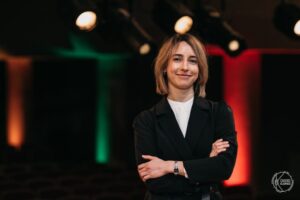“I’m changing Europe!”


The mission of Europe Goes Local is to strengthen the youth work community of practice at the local level. Aligning knowledge and experience across all dimensions, offering tools and opportunities for collaboration while strengthening dialogue and building bridges between local, national, and European stakeholders is at the heart of the EGL platform. For us, sharing knowledge and good practices comes not only as a chance to learn but also as an opportunity to apply and adapt the experience locally in order to elevate the quality of youth work.
Today we meet Aleksandra Lobaskova, Klaipeda-EYC 2021 Partnership and External Affairs Coordinator. We discuss Klaipeda Municipality’s journey: the road to the title, the challenges of 2021, the impact the experience had on local youth work, and how it changed the community for the better.

Aleksandra Lobaskova
A: Let's take a quick look at recent history. When Lithuania became a member of the European Union (EU) in 2004, Lithuanian citizens used the opportunity to improve their quality of life by emigrating to other EU countries, which offered better employment opportunities and higher salaries. As EU labor markets became accessible, that in turn fostered youth to move abroad, particularly in the light of high youth unemployment rate in the country. Besides emigration, inter-regional migration has also been present till today. Young people have been choosing life in Vilnius over Klaipeda due to better career prospects, a wider selection of entertainment services, and a buzzing social life.
According to the Lithuanian Department of Statistics, the number of young people in Klaipeda in 2019 reached 24,626. That was 14.9% less than in 2015. The decrease in Klaipeda’s youth population as well as in the general Lithuanian population represented a significant issue for the community. In addition, Klaipeda was often being referred to as a boring and unattractive city with an absence of a solid youth policy strategy, exhibiting selective solidarity and reluctance to discuss taboo themes. Social and civic inactivity paired with weak conditions for personal and career growth signalized the need for change.
The decision to participate in the European Youth Capital (EYC) competition came from a former municipal project aimed to attract young people back to Klaipeda and encourage them to stay in the city after graduation. Together with the municipality representatives, active and ambitious youngsters formed an initiative group that started working on submitting the application for the EYC title. Youth’s engagement in critical decision-making on the municipal level and recognition of its ability to develop the project program appeared to be a key factor in achieving EYC competition success.

A: First, it needs to be emphasized that the Klaipeda European Youth Capital 2021 project was fully based on the involvement of young people: from generating the idea to the implementation of the EYC program activities, taking into account small procedures. This youth inclusive model became a perfect example of how youth’s crucial needs for autonomy and competence can be fulfilled on a larger scale. Despite having developed our recipe for success, there were a few lessons #chooseklaipeda learned on the way to becoming the European Youth Capital.
Perhaps not so many readers might know that Klaipeda won the title for the second time. The newly formed initiative group consisting of a few Klaipeda city municipalities and representatives of Klaipeda Association of Youth Organizations “Round Table”, submitted an EYC application in 2017. Unfortunately, it didn't proceed to the end. The underestimated complexity of the EYC competition played a trick and as a result, an application strategy had to be reconsidered. Instead of involving only active and organized youth in the process, it was decided that youth who weren't part of formal youth structures, had to join #chooseklaipeda for the voice to gain more power. Thus, more than 500 youngsters were involved in the preparation stage. The application turned out to be more diverse and could better reflect the needs of different youth groups by visiting educational institutions, youth NGOs and integrating single youth in the workshops.

The improvements were also made in the project communication strategy. The focus switched to active promotion of #chooskleaipeda like participation in various events, public presentations of #chooselaipeda on national and international arenas, and obtained support from the partners.
The city finally arrived at the finish line after investing extra efforts into correcting mistakes. Klaipeda won the title in 2018 and officially became the first European Youth Capital in the Baltic region. The period from 2019 till the end of 2020 mostly involved preparation as capacity-building activities and various pilot events. There were more than 3 million people informed about the project. This number increased to 8 million people after the title year.
A: The city challenges, brought to light by youth to a great degree coincided with the municipal view on the existing challenges at that moment. When reading the application form, for the majority Klaipeda EYC 2021 program may appear complex and multifarious. This is because its structure was determined by the raised city problems. It is important to note that #chooseklaipeda ambassadors’ movement (not the organization) was established before Klaipeda applied for EYC, in 2018. A group of young enthusiasts operated together to reveal youth’s potential and inspire local youth to take action. Thanks to the EYC program, our aim was to present unknown aspects of Klaipeda’s life in a different way, by forming a feeling of belonging to the city, developing and maintaining an open, cooperative relationship.
Inspired by people’s sincere and strong desire for change, it is also understandable that the project cannot solve the proposed challenges in one year. Thus, the major project focus was on making the first steps towards the big change by creating an attractive and lively city that drives youth’s attention and makes everyone feel welcome to study, work, and create.
A: The program flowed in 3 major directions: Act, Create and Reveal.
Based on that, 9 different platforms were introduced (Dialogues, Leadership, Solidarity, Out of the Box, North-South, Spaces, Colours, Connections, Potential) to tackle the city problems by employing modern and creative practices such as trainings, forums, hackathons, conferences, festivals, and a lot more. Considering young people at risk of social exclusion like ethnic minorities, students from abroad, NEET youth, individuals with disabilities, and LGBT+ community representatives, we invested all the effort to integrate the mentioned groups as much as possible. We can for example proudly share that we pioneered providing sign language interpretation for musical concerts in Lithuania.

Some platforms focused on the development of hard skills like international entrepreneurship competitions and SDG hackathons. Others platforms emphasized soft skills like VR educational sessions to promote empathy, team-building training, etc. Thanks to the joint effort of the Klaipeda EYC 2021 core team, platform coordinators, and partners, we managed to organize more than 130 different youth-focused activities. We attracted more than 86,000 participants, 700 volunteers, and 200 project partners during the title year.
Last but not least, #choosklaipeda team is working at the moment on ensuring the continuity of the project’s strategic initiatives. For example, we foresee that such projects as Lithuanian Youth Capital, Klaipeda’s Youth Forum, development of youth strategy, experimental openness and culture incubator, participatory budget for pupils will continue their work after Klaipeda EYC 2021 is officially over.
A: The period from 2018 to 2022 has been quite challenging and turbulent for the #chooseklaipeda team and ambassadors, not without a reason. Besides winning the EYC competition for the second time, it is important to mention that the Klaipeda EYC core team's organizational structure experienced many changes throughout the last few years. It allowed to expand the project’s creative horizons, but in some cases worked as a brake, slowing down the project's implementation process. Hence the many adjustments that needed to be done. For instance, as we were closely working with young people, the project was largely based on social interactions and emotional connection, so young people needed time to get used to new members of the team.
Since the project budget we had applied for was reduced to a large degree it also made us come up with many creative solutions to satisfy the ambitious EYC project application program.

We can't skip COVID-19 pandemic effects on the project for sure. Looking from a positive lens: the pandemic experience encouraged us to learn to find new ways how to adapt the project and adjust ourselves, so that the activities could still represent an interest for our main audience.
It has been a wonderful journey. Be it with the pandemic, the unexpected changes, or the everchanging Klaipeda weather! The title that was given to Klaipeda is a remarkable achievement, which as we hope, served as an inspiration to other Lithuanian and European cities to empower young citizens and reveal their potential. Not only young people, but also the older generation started paying attention to the youth sector and realizing that there is so much potential and gaps to work with. The change always starts from the small steps and speaking “loudly” about youth rights and issues is the first step we, in Klaipeda, made.
